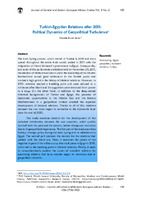Turkish-Egyptian Relations after 2011: Political Dynamics of Geopolitical Turbulence

Megtekintés/
Metaadat
Teljes megjelenítés
Link a dokumentumra való hivatkozáshoz:
Gyűjtemény
Absztrakt
The Arab Spring process, which started in Tunisia in 2010 and soon spread throughout the entire Arab world, ended in 2011 with the resignation of Hosni Mubarak’s government in Egypt. Subsequently, as a result of the parliamentary elections held on November 28, 2011, the election of Mohammed Morsi under the leadership of the Muslim Brotherhood caused great enthusiasm in the Turkish public and marked a high point in the history of bilateral relations. However, in 2013, relations reached a breaking point and were reduced to a minimum after Morsi and his supporters were removed from power in a coup. On the other hand, in addition to the deep-rooted historical backgrounds of Turkey and Egypt, the presence of diplomatic opportunities in the Middle East and the Eastern Mediterranean in a geopolitical context enabled the repeated development of bilateral relations. Thanksto all of this, relations between the two states began to normalize at the diplomatic level since the end of 2020.This study examines reasons for the development of the turbulent relationship between the two countries, which quickly reached both the peak and the bottom, before it began to normalize due to its geopolitical importance. The first part of the study examines Turkey’s foreign policy during the Arab Spring and its reflections on Egypt. The second part analyzes the reasons for the relations that peaked with the Morsi era. Then, it examines the causes of the negative impact of the military coup that took placein Egypt in 2013, which led to the breaking point in bilateral relations. Finally, it seeks to comprehensively explore the causes of turbulent relations by examining relations that have recently begun to normalize due to geopolitical concerns.
- Cím és alcím
- Turkish-Egyptian Relations after 2011: Political Dynamics of Geopolitical Turbulence
- Szerző
- Şener, Mustafa Burak
- Megjelenés ideje
- 2024-02-18
- Hozzáférés szintje
- Open access
- ISSN, e-ISSN
- 2786-1902
- Nyelv
- en
- Terjedelem
- p. 109-127.
- Tárgyszó
- Arab Spring, Egypt, geopolitics, turbulent relations, Turkey
- Változat
- Kiadói változat
- Egyéb azonosítók
- DOI: 10.59569/jceeas.2023.3.2.152
- A cikket/könyvrészletet tartalmazó dokumentum címe
- Journal of Central and Eastern European African Studies
- A forrás folyóirat éve
- 2023
- A forrás folyóirat évfolyama
- 3. évf.
- A forrás folyóirat száma
- 2. sz.
- Műfaj
- Tudományos cikk
- Tudományterület
- Társadalomtudományok - multidiszciplináris társadalomtudományok
- Egyetem
- Óbudai Egyetem
- Kar
- Bánki Donát Gépész és Biztonságtechnikai Mérnöki Kar
